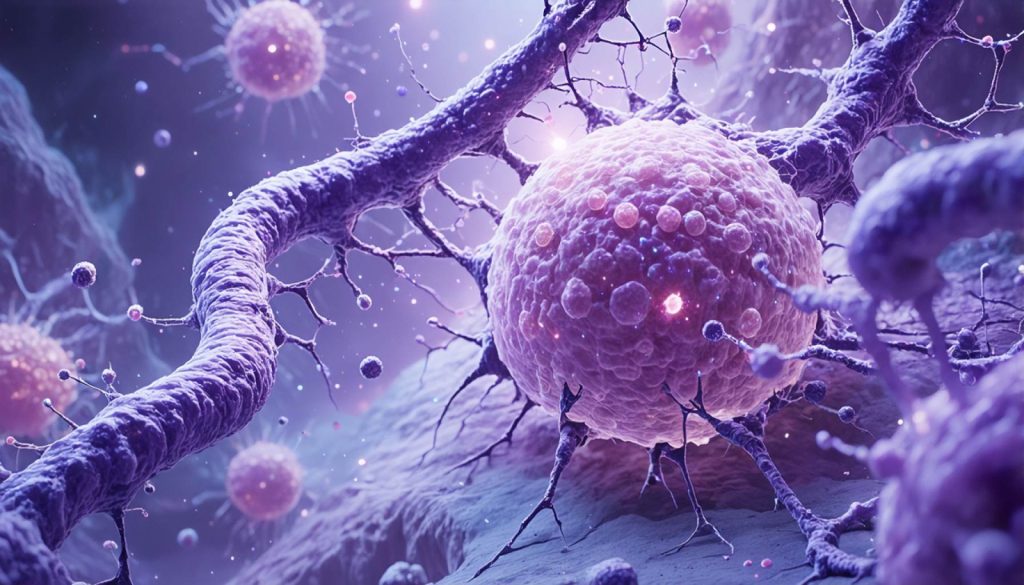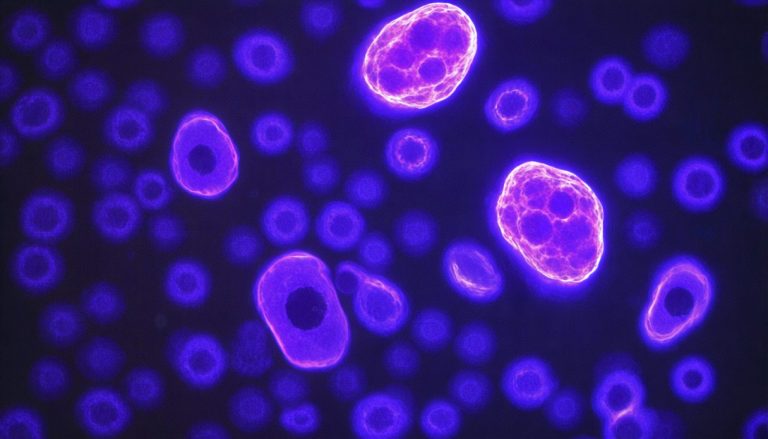
- Tahoe Therapeutics has introduced the revolutionary Tahoe 100M dataset, offering insights into over 100 million single cells across 50 cancer types.
- The Mosaic Platform by Tahoe layers 20,000 measurements of gene expression per assay, enhancing drug discovery with detailed cellular resolution.
- The initiative promotes open science through the Arc Virtual Cell Atlas, fostering collaboration and innovation in drug interaction modeling.
- The dataset empowers AI applications, such as Dr. Bo Wang’s scGPT, to explore nuanced cellular reactions for developing tailored cancer treatments.
- CEO Dr. Nima Alidoust champions the “AI-first” approach, highlighting early understanding of biological interactions as vital in transforming cancer treatment.
- Tahoe 100M dismantles data silos, driving the scientific community towards conquering cancer through open access and innovative research.
In the frontier of cancer research, a revolution is unfolding, spearheaded by Tahoe Therapeutics with the unveiling of their groundbreaking dataset, Tahoe 100M. Imagine peering into the secret lives of over 100 million single cells, each one a microcosm of cellular drama, revealing how drugs alter their fates. This new dataset, amassed from 60,000 cutting-edge experiments, illuminates the therapeutic landscape across 50 distinct cancer types. It does more than just increase our collection of data; it redefines the boundaries of what’s possible in drug discovery.
With audacious vision, Tahoe Therapeutics delivers a technology akin to an artist creating a multifaceted mosaic: their “Mosaic Platform.” Each tiny piece of this mosaic offers an intricate view into the cellular response to drugs, laying bare the gene expression data of individual cells. This platform delicately layers approximately 20,000 measurements across all protein-coding genes per assay, promising uncharted cellular resolution.
In a substantial leap for collaborative research, the data emerges not only as a resource but as a beacon of progress. By gifting the world with access to this vast repository, Tahoe Therapeutics sets a precedent—valuing open science and shared knowledge above all. In partnership with the Arc Institute, they’ve launched the Arc Virtual Cell Atlas. Here, seekers of data and innovators armed with AI can download this treasure to model, predict, and craft the future pathways of drug interactions.
Critically, the release of Tahoe 100M resonates deeply within the scientific community. Dr. Bo Wang, a vanguard in AI for healthcare, stands amongst those eager to explore the dataset’s depths. His lab’s creation, the pioneering single-cell GPT model (scGPT), already translates the quiet language of human cells into actionable insights. The addition of Tahoe’s dataset fuels further exploration into the nuanced, dosage-dependent reactions of cells. Here, AI can be trained to anticipate the subtle interactions within the cellular cosmos, offering the promise of more tailored and effective treatments for cancer patients.
Dr. Nima Alidoust, Tahoe’s visionary CEO, underscores the potential of this initiative, emphasizing how vital it is to understand the intricate tapestry of biological interactions early in drug discovery. Through embracing datasets like Tahoe 100M, we initiate a transformative shift toward “AI-first” strategies in the pursuit of cancer cures. It’s a shift that heralds a paradigm where technology accelerates the journey from hypothesis to healing with remarkable precision.
In a world where data silos hinder progress, the introduction of Tahoe 100M shatters these barriers. It invites us to reconsider the goals of our scientific endeavors—not merely to comprehend cancer but to conquer it. As we step into this new age of AI-enhanced research, the takeaway is clear: through open access and relentless innovation, we are crafting the tools to unlock the intricate complexities of human health, one cell at a time.
The Game-Changer in Cancer Research: Unraveling Tahoe 100M and Its Global Impact
Overview of Tahoe 100M and Its Impact
Tahoe 100M is a revolutionary dataset introduced by Tahoe Therapeutics, comprising information from over 100 million single cells. This massive database is an unparalleled tool in the field of cancer research, elucidating the responses of cells to various drugs across 50 different cancer types. This innovation provides researchers with a granular understanding of cancer cell behaviors, drug efficacy, and potential new therapeutic pathways.
The Potential of the Mosaic Platform
Tahoe Therapeutics’ Mosaic Platform is akin to a high-resolution microscope, revealing the effects of drugs on gene expression at the single-cell level. Each assay generates approximately 20,000 measurements over all protein-coding genes, enabling researchers to examine cellular reactions with unprecedented detail and accuracy.
How AI and the Arc Virtual Cell Atlas Augment Research
– Artificial Intelligence Integration:
The dataset is a boon for AI models like Dr. Bo Wang’s single-cell GPT model (scGPT), which can interpret complex biological data to provide actionable insights. By training AI on this rich dataset, researchers can predict cellular responses to drugs with greater precision, facilitating customized treatments for cancer patients.
– Arc Virtual Cell Atlas:
A collaboration with the Arc Institute, this atlas allows researchers worldwide to access Tahoe 100M. By promoting open access, scientists, and AI innovators can utilize this data to model and predict drug interactions and outcomes.
Breakthrough in Collaborative Research and Open Science
Tahoe 100M symbolizes a shift towards open science by offering publicly accessible knowledge that encourages global collaboration. This shared resource not only accelerates research but also democratizes access to cutting-edge scientific tools, potentially leading to groundbreaking discoveries and innovations.
Real-World Use Cases and Market Trends
– Drug Discovery and Precision Medicine:
Pharmaceutical companies and researchers can utilize Tahoe 100M to streamline drug discovery processes and advance precision medicine approaches.
– Industry Trends:
The dataset reflects a broader industry trend towards leveraging big data and AI in healthcare, with a focus on improving outcomes for cancer patients by understanding complex biological interactions.
Key Features and Specs
– Dataset Size: Over 100 million single cells
– Experiment Count: 60,000
– Cancer Types Covered: 50
– Gene Measurements per Assay: Approximately 20,000
Potential Limitations and Controversies
There is an ongoing discussion regarding data privacy and ethical concerns when dealing with extensive biological datasets. The integration of AI also brings up concerns about algorithmic biases and the interpretability of AI-driven insights.
Actionable Recommendations for Researchers
1. Leverage AI Tools: Utilize AI models alongside Tahoe 100M for efficient data analysis and hypothesis validation.
2. Collaborate Openly: Engage in global collaborations to maximize the potential of open science and shared datasets.
3. Stay Updated: Keep abreast of new findings and updates from Tahoe Therapeutics and similar initiatives to remain at the forefront of cancer research.
Tahoe 100M is a cornerstone in the ongoing evolution of cancer research and precision medicine. Through innovative applications of AI and open-access principles, it paves the way for impactful advancements in understanding and treating cancer.
For more information on cutting-edge medical research and AI applications, visit the official Tahoe Therapeutics website and the Arc Institute website.



